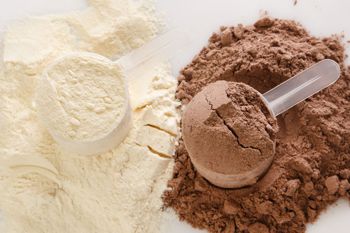
Bodybuilding: What You Don’t Know About Protein Powders

We all know that proteins are the building blocks of muscle and that amino acids are the building blocks of proteins. In an effort to ensure we have enough proteins in our body to build muscle many of us turn to powders, most often whey protein. Unfortunately due to not understanding how different types are digested we often end up using these powders ineffectively. In this post, we’ll learn about whey and casein proteins. What are the differences between them, and when should we be using them?
Used properly, these powders can be a key ingredient in bodybuilding success. Unfortunately these powders are arguably the most misused supplement and many people are getting little to no benefit from them.
9 Essential Amino Acids
There are 9 essential amino acids. They are called essential because our body can’t make them and can’t store them. So it’s ‘essential’ we get them in our diet. If our body runs out of these amino acids it will tear apart our muscle tissue to get them. If we’re trying to build muscle, this is obviously an undesirable state. It’s also very bad when losing weight. We want weight lost to be fat, not muscle. Losing muscle is a metabolic disaster, as it lowers our Basal Metabolic Rate. This means we need to cut calories even further to continue losing weight and this can turn into a vicious cycle. So don’t think that they are only important if you’re bulking. They are equally important when cutting.
Since most of us simply don’t have the time to ensure we’re getting enough of the right kind of protein from our diet, the powders can be a godsend. Too bad most people are using them wrong and getting little to no benefit.
Whey vs. Casein Protein Powder

The most common form of the powder by far is whey protein. Not just available in bodybuilding supplement stores, in most places you’ll find it on your grocery or drugstore shelves. It’s relatively cheap too. It is also the most commonly misused supplement by a wide margin.
Both whey and casein are found in milk, but there the similarity ends. They have different molecular structures and are digested at vastly different rates.
Whey and casein powders are both synthesized from milk, but there the similarity ends.
It is fast digesting, absorbed into our bloodstream in about an hour, and used up by our muscles about as quickly. This means it’s perfect for post-workout, but not for any other time of day (with one exception which we’ll get to shortly). If you’re using it as a supplement in the afternoon or evening (assuming you didn’t just work out) you might as well flush it down the toilet. You’ll get almost no effect from it.
In addition to its fast digestion, whey also has a higher concentration of the amino acid leucine. Leucine stimulates protein synthesis, which is a fancy way of saying it boosts muscle growth when muscles are in an anabolic state. This is another reason why it’s perfect for post workout. You may have heard of the ‘golden hour’. This is the period immediately following resistance training when your body is working hardest at repairing the damage training did – by building new muscle. To understand how our body does that exactly, read Physiology 101: How Our Body Builds Muscle.
Whey For Breakfast!
OK, that’s a little sensationalistic. You should be eating a healthy breakfast of it and complex carbs with some fats. Skipping breakfast is very unhealthy and especially bad if you’re working at building muscle. But breakfast takes time to make.
Most of us have a morning routine that means there’s a delay of anywhere from 20 to 90 minutes from the time we get up to the time we hit the kitchen for brekky. But our stomach is likely empty when we wake up, just as our metabolism is kicking into a higher gear. A dose of whey within minutes of getting out of bed will ensure we’re avoiding entering a catabolic state during this period. Whey is better at this point in the day than casein because it’s quickly digested and the extra leucine boosts protein synthesis.
Casein Protein: The Muscle Defender!
Casein protein is long digesting – about eight hours. This means it’s great for supplementing your diet throughout the day to ensure you always have those essential amino acids. By doing this, you avoid going into a catabolic state where your body is breaking down your own muscle tissue. Whether you’re working hard to bulk up or cutting calories to slim down, supplementing with casein two or three times per day is an effective way to preserve and protect your muscles. Think of casein not only as a source of it, but a muscle defender that blocks it breakdown in your cells. In one study, casein was shown to avoid muscle breakdown over whey protein by a factor of 34%.
Casein is typically only available at supplement stores, and be prepared for sticker shock. It’s usually quite a bit more expensive than whey. This is amplified by the fact that you could be using about twice as much casein as whey too. As whey should be taken only first thing in the morning and post-workout you likely won’t have more than seven to ten servings per week. If you had three servings per day of casein, you’d take 21 servings per week.
Which is Better?
Neither one. You should be using them both. Use whey post workout and first thing in the morning, within minutes of getting out of bed. Use casein two or three times throughout the day, with servings spaced six to eight hours apart. Definitely take a serving of casein before bed. By combining these powders this way you’ll ensure your body always has the amino acids it needs to avoid muscle breakdown and fuel muscle growth.
What About Egg Protein?

Eggs are a superfood. Loaded with protein and healthy fats they can be a bodybuilder’s best friend. Egg has a different structure than both whey and casein. They are digested in about three hours and are not available in powdered form. If you eat eggs for breakfast, that’s great. There are few better foods, but remember that three hours later your body is now running short of it. Time for a serving of casein!
Beware protein bars! They contain only whey …plus A LOT of sugar. This isn’t nutrition. It’s candy. Unless you just worked out, the only thing you’ll get from eating these is fat.
Don’t think that eating meat means you can wait longer for that serving of casein. While meat can take as long as six hours to digest, you’re safer figuring on three hours. This means you can treat meat for breakfast the same as eggs. Within three hours you should be having a serving of casein unless you’re about to have another serving of dietary protein.
How Much Protein Do You Need?
For decades, it’s been believed that bodybuilders need one gram of it per pound of body weight per day. That’s 2.2 grams per kilo. However recent research suggests the ideal number is actually three grams per pound or 3.3 grams per kilo. You can read more about that here.
Will Dove
Latest posts by Will Dove (see all)
- Body Weight Training 2.0: Calisthenics - 22 Apr
- All About Protein Powders - 9 Apr
- Top 5 Fitness Trends for 2019 That You Should Try - 30 Mar
